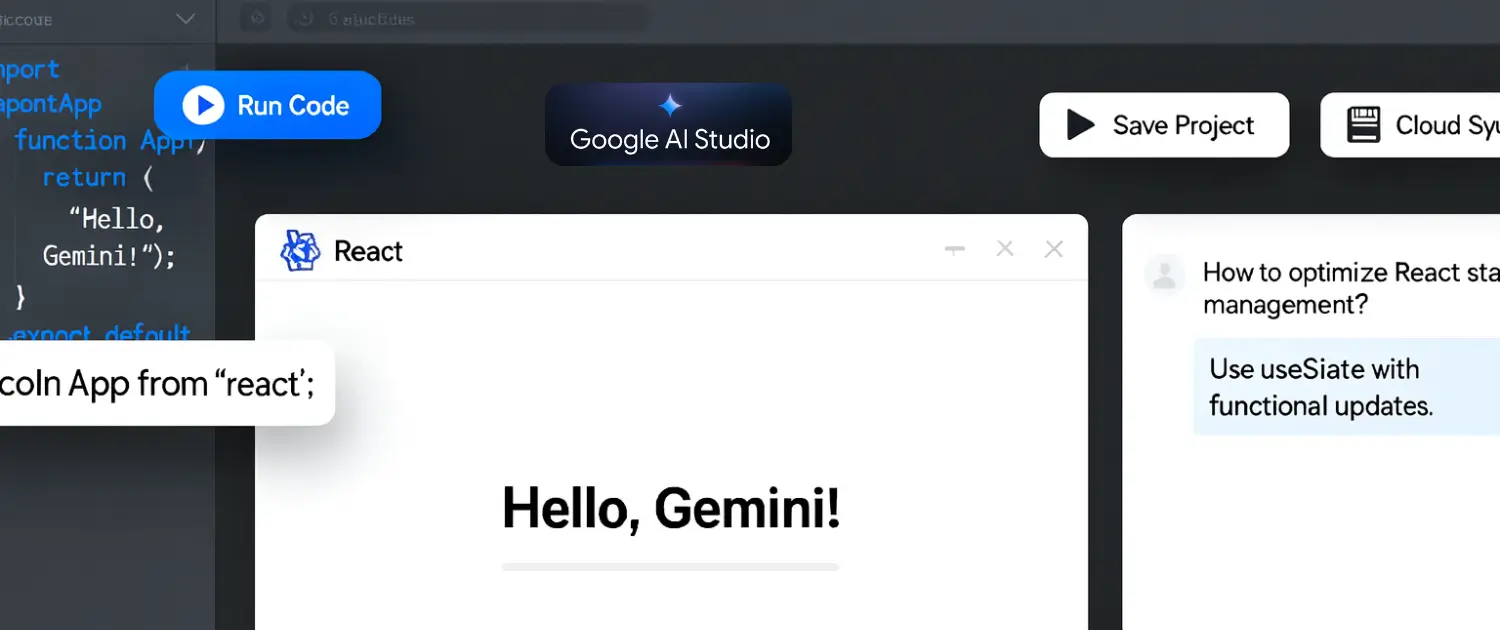- Lifetime Solutions
VPS SSD:
Lifetime Hosting:
- VPS Locations
- Managed Services
- Support
- WP Plugins
- Concept

The latest AI Studio platform, with the recently launched Gemini 3 Pro model, has enabled Google to fundamentally change the way developers develop web applications. This is a very strong collaboration, as developers can create full, functional React web apps directly based on the instructions received through natural language, with live previews and immediate deployment in mind, without the need to have a traditional backend infrastructure, databases or software development kits (SDKs) within the machine of a developer.
The most significant breakthrough in this integration is Google bold focus on frontend-first development. When developers input a description of their application into AI Studio’s Build mode, Gemini 3 Pro orchestrates a sophisticated generation pipeline that produces a fully operational web application, but notably, without creating actual backend servers or SDKs. This represents a paradigm shift from conventional full-stack development workflows.
The created apps are based on a web app design that is created using React and TypeScript frameworks. The advanced settings allow developers to choose between React and Angular templates, and Tailwind CSS is the layer that offers the styling. The model will provide automatic structuring of projects in appropriate component hierarchies, state management and responsive design patterns. When deployed, these applications can be hosted on various cloud infrastructure platforms, where the critical API keys and authentication credentials remain securely server-side.

Modern development environment with API integration and web application preview
The revolutionary aspect of this approach is the fact that it is upfront in terms of scope: Google AI Studio produces production-ready frontend code that calls Gemini API functionality directly. The system does not generate backend services, develop proprietary SDKs or generate database structures. In its place, it develops web applications which smart API calls to the Gemini services of Google, which is the computational infrastructure.
The revolutionary aspect of this approach is the fact that it is upfront in terms of scope: Google AI Studio produces production-ready frontend code that calls Gemini API functionality directly. The system does not generate backend services, develop proprietary SDKs or generate database structures. In its place, it develops web applications which smart API calls to the Gemini services of Google, which is the computational infrastructure.
The technical improvements over previous generations are substantial. Gemini 3 Pro achieves a 1487 Elo rating on the WebDev Arena leaderboard, signifying its superiority in web development tasks. The model scores 54.2 percent on Terminal-Bench 2.0, measuring tool-use ability for terminal operations, and an impressive 76.2 percent on SWE-bench Verified, benchmarks that evaluate code generation for complex software engineering problems.
Technical advances in relation to the past generations are very high. Gemini 3 Pro is ranked number 1487 in the WebDev Arena leaderboard, indicating that it is better in web development activities. The model obtains 54.2 percent on Terminal-Bench 2.0, a tool-use benchmark of complex operations involving terminal operations, and a whopping 76.2 percent on SWE-bench Verified, benchmarks testing code generation of complex software engineering problems.
Google AI Studio Build mode is a paradigm shift in the development environment. The interface is based on the two-pane paradigm: the conversation panel, which allows refining the work in an iterative manner, a real-time code editor and a live application preview. Developers state their aim of the application, and the system will create a full file structure, namely App.tsx, component files, stylish sheets and configuration files.
The Annotate App feature is an invention of a visual iteration layer that has never existed on AI development platforms. Instead of coding changes, developers can simply annotate the live preview, pointing to UI elements and making natural language descriptions about what is changing. The system reads these annotations, and it has the power to transform the underlying React code so that the developers can center this button or animate this image to slide in from the left by visual means as opposed to normal syntax.
The platform contains templates that are already completed, and there is an I’m Feeling Lucky button that sets up random project ideas that allowing the programmers to experiment with the system to find out what it could do. To the developers who want to use a particular technical stack, the system instructions panel enables the choice between React or Angular, and system prompts are used to select the preferred coding style and framework.
AI-powered code generation architecture and cloud deployment workflow

The critical distinction developers must understand is what AI Studio does and does not generate. The system excels at creating user interfaces, client-side logic, and API integration code. However, it deliberately stops short of generating actual backend servers, databases, or traditional SDKs.
Developers have choices in real-world applications where there is a need to persist data or complicated server-side code. The applications created can be connected with external APIs via the Gemini API infrastructure. Google has a secure credential storage option in the form of environment variables, where the applications can safely identify themselves with third-party services. Alternatively, the produced code can be exported to GitHub by developers and further developed with a backend infrastructure with services such as Firebase or personalized Node.js.
This architectural decision reflects a pragmatic understanding of AI capabilities. Generating coherent frontend code remains within the model’s strengths. At the same time, backend logic, particularly database schema design, authentication flows, and microservice orchestration, involves architectural decisions that vary dramatically based on specific business requirements.
Google has implemented a sophisticated security model addressing the primary concern with AI-generated applications: API key exposure. When applications are deployed to production hosting environments from AI Studio, the Gemini API key remains completely server-side. Client-side code cannot access or expose these credentials, regardless of whether the application is downloaded or shared.
This is opposed to the traditional development process in which developers tend to reveal API keys in frontend code. The architecture of AI Studio means that any API requests to the generated React application will be proxied on secure backend infrastructure, with the cryptographic separation between the client and authentication credentials.
The experience with deploying the tools is an example of Google being able to reduce friction. Applying the applications can be made to different hosting platforms with simplified workflows, which automatically have stable HTTPS and an inbuilt autoscaling endpoint. In modern serverless systems, applications can be efficiently scaled according to demand, which is efficient in order to optimize cloud costs when there are new projects that require experimental use or when there is a workload to be served.
The GitHub integration workflow enables version control and development continuity. Developers can push projects to GitHub repositories directly from AI Studio, maintaining a comprehensive commit history. However, the current implementation supports push operations but not bidirectional synchronization, pulling code changes from GitHub back into AI Studio requires manual file replacement.
The practical applications of this technology extend across numerous use cases. Developers have demonstrated building fully functional web applications in under 60 seconds, including dice-rolling games with audio effects, content brainstorming tools, meal planning applications, and interactive quiz systems.
Early testers report that Gemini 3 Pro’s generation quality represents a generational leap. Complex features that required 60-80 iterative prompts with Gemini 2.5 Pro now often succeed in single attempts. Applications emerge with proper error handling, state management, responsive design, and using TypeScript type safety, production-grade quality previously requiring hours of manual development.
The combination of Google AI Studio and Gemini 3 Pro turns application development into new forms of democratization never before seen. Non-technical entrepreneurs are able to describe the application ideas and get functional prototypes. Android developer tools can assist student developers to learn software architecture using code inspection. The teams can quickly prove ideas by professional teams prior to investing in standard development cycles.
Nevertheless, developers need to consider this technology just as a prototyping and frontend-generation platform and not an entire substitute for standard development. Backend logic, database design, authentication systems and complicated business logic are still issues whose human architectural knowledge provides better results. The best process would entail AI Studio to do quick frontend iteration and custom backend development according to the requirements of the application.
Google’s roadmap suggests continued expansion of this platform. The recent integration of Canvas features on mobile platforms enables developers to generate applications directly on smartphones. Enhanced error resolution capabilities automatically attempt to fix bugs in generated applications, reducing the iteration cycles needed to reach production quality.
The wider industry acceptance of the method can be seen through adoption patterns. The developers are starting to realize that generation of the frontend is an aspect where AI is at its best, and that the architectural decision-making, backend system, and development of business logic should be left to human knowledge.
The partnership between Google AI Studio and Gemini 3 Pro represents more than a product update; it’s a paradigm shift in how applications come into existence. By focusing narrowly on frontend generation while providing secure API infrastructure through Google Cloud services, Google has created a platform that accelerates development cycles while maintaining production-grade security and code quality standards.
Key Takeaways:

Netanel Siboni is a technology leader specializing in AI, cloud, and virtualization. As the founder of Voxfor, he has guided hundreds of projects in hosting, SaaS, and e-commerce with proven results. Connect with Netanel Siboni on LinkedIn to learn more or collaborate on future projects.